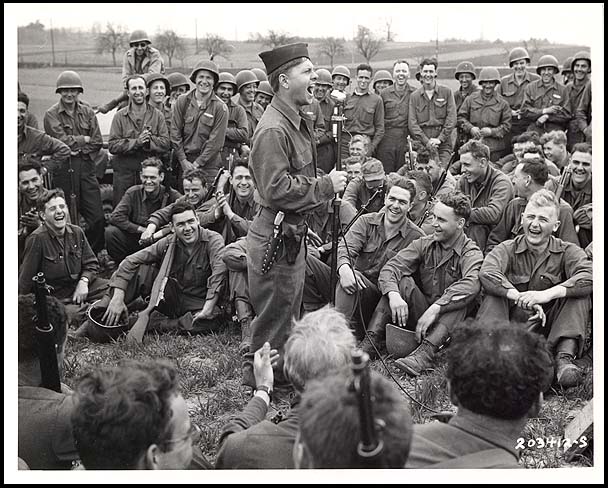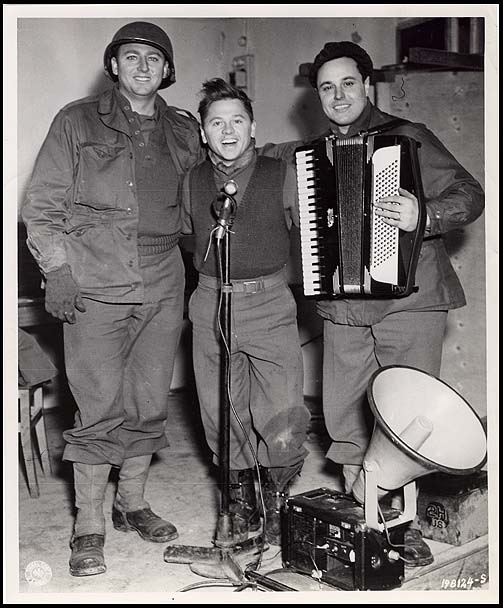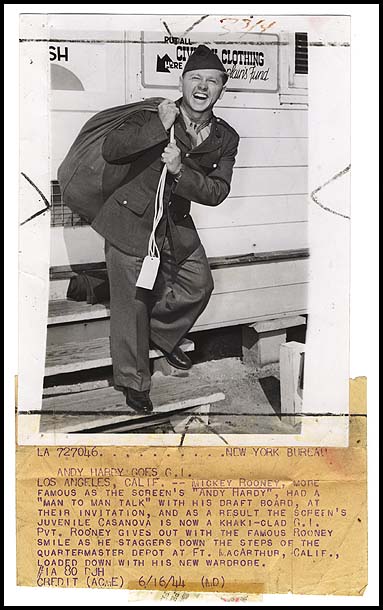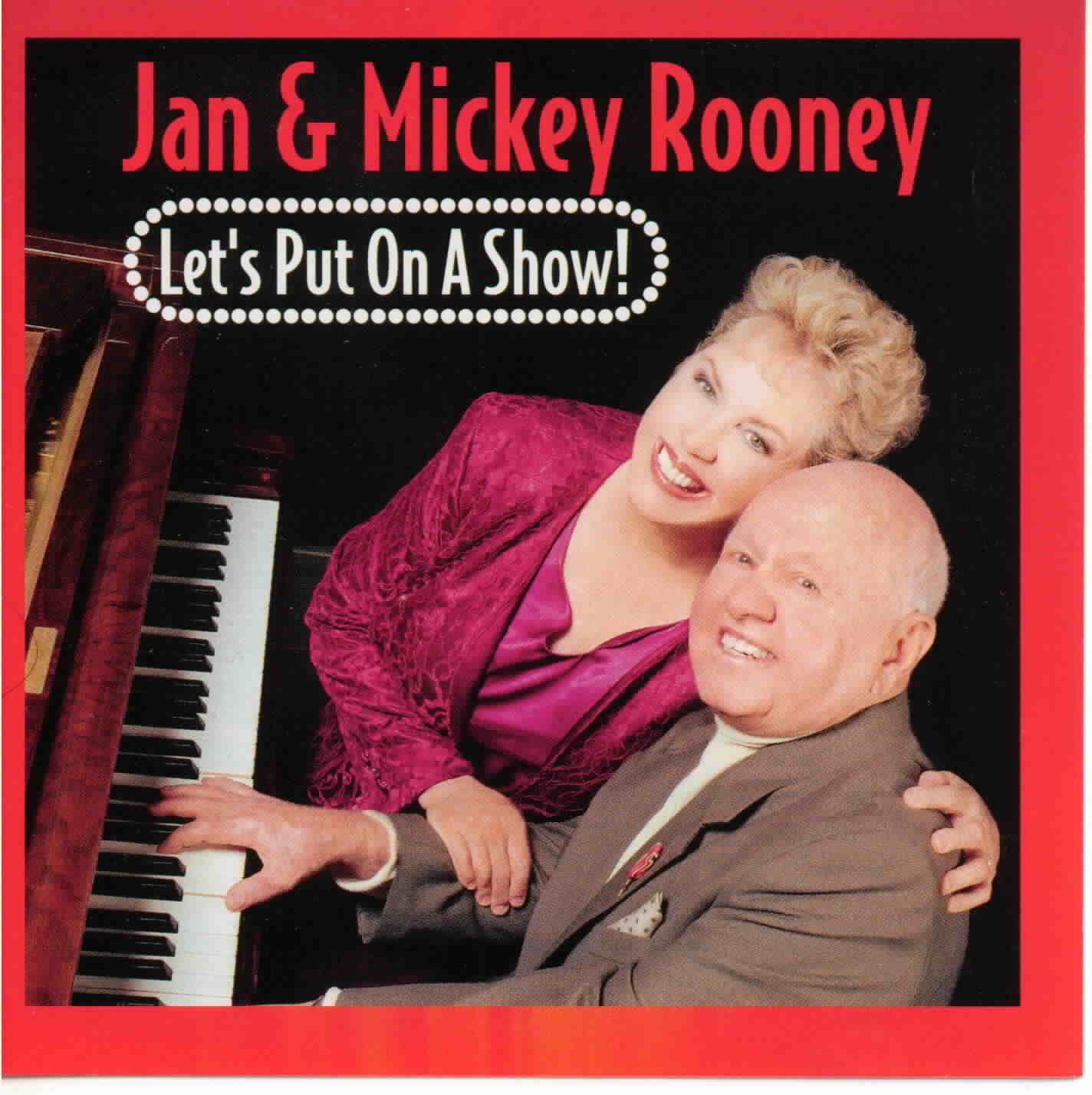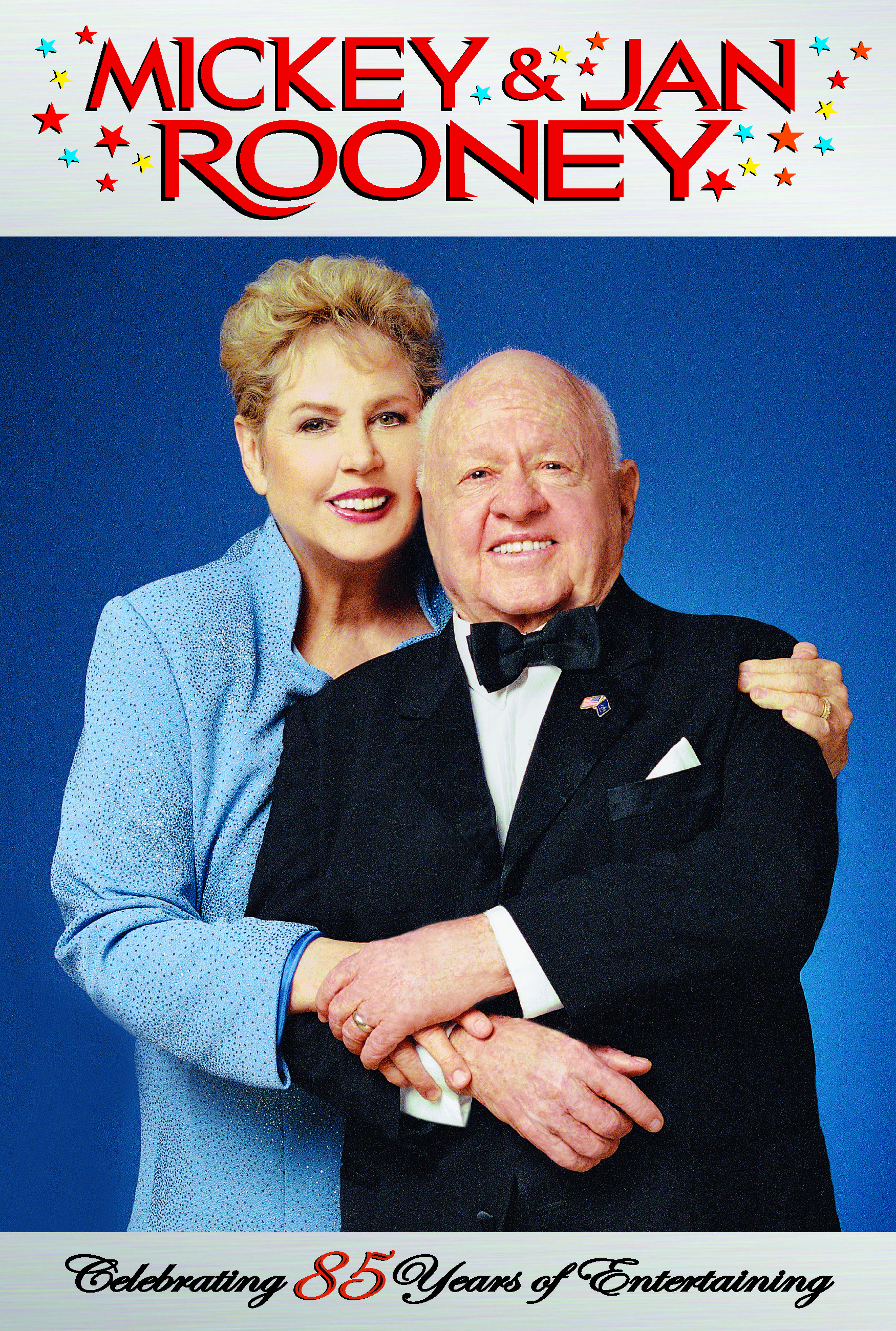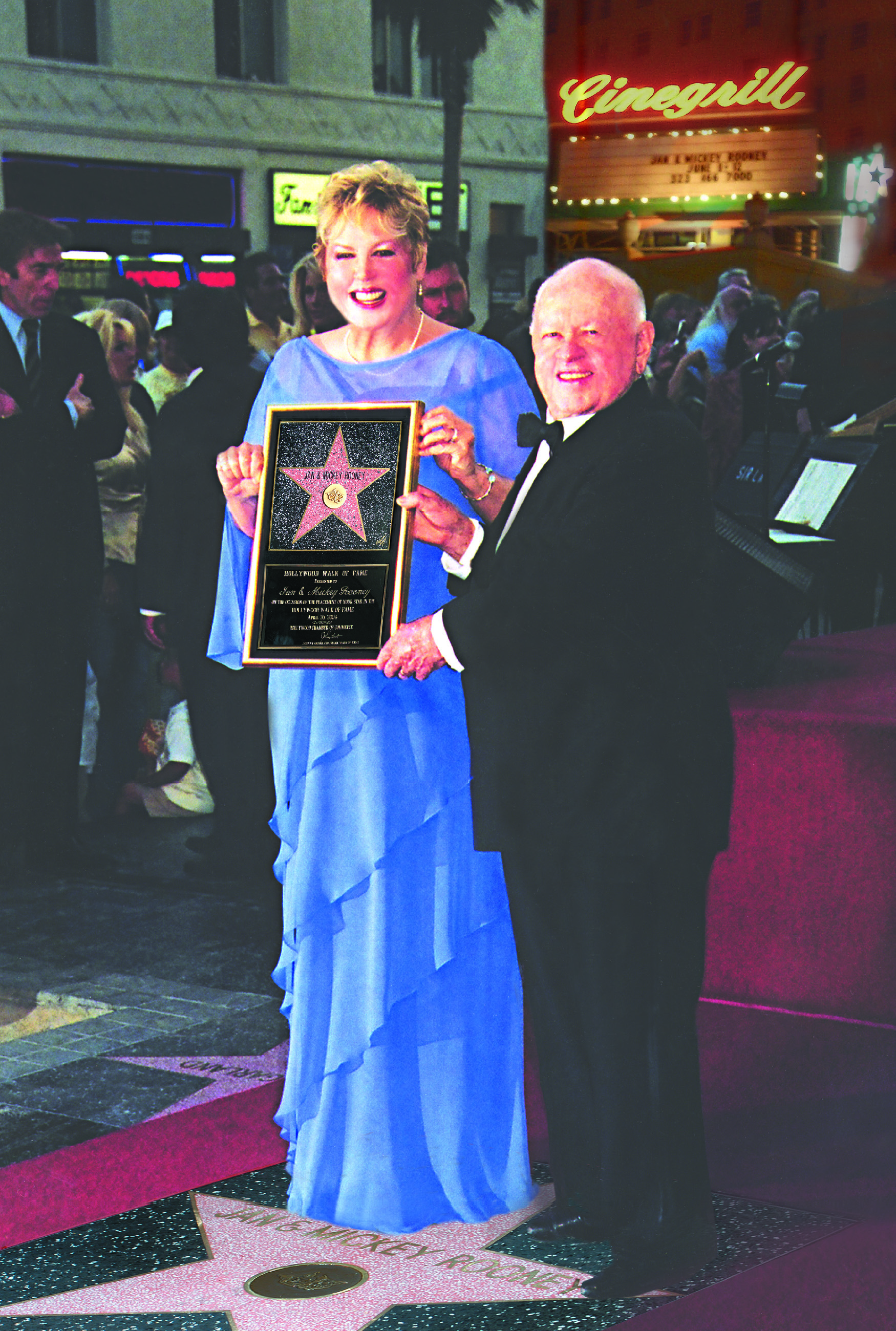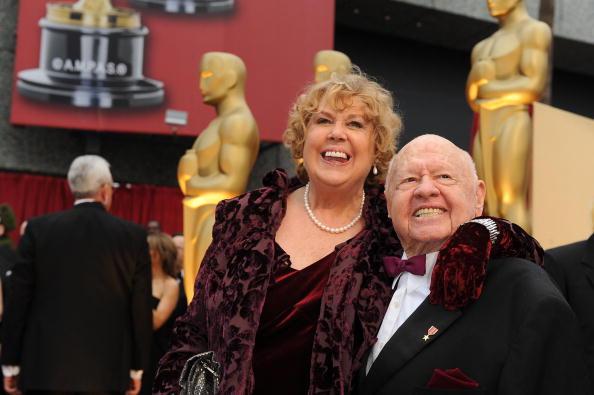Service to his Country
Jeep Shows
Rooney became the top movie box-office draw in the early 1940s when he was featured in The Human Comedy (1943) and National Velvet (1944). His career, however, was interrupted by his Army service during World War II. Initially classified 4-F because of high blood pressure, he again visited the Selective Service Center and asked for new tests. He passed the second time and was reclassified 1-A. National Velvet was in production at the time, and MGM decided to shoot Rooney' s scenes first when he was told that he would called up for Army service within a month. His costar in the movie was twelve-year-old Elizabeth Taylor. In June 1944 Mickey Rooney was inducted into the Army at Fort MacArthur, near San Pedro, California. Three days later he was on troop train headed for calvary training at Fort Riley, Kansas. He enjoyed the forced marches, the heavy packs, the obstacle courses, and the hours he spent on the rifle range. He qualified for the sharpshooter badge with an automatic rifle. Within two weeks the actor was made a squad leader. One of the men in the squad too exception to Rooney' selection as leader, saying that he only got the position because he was a movie star. Rooney would not stand for such guff, and the two had it out in a fierce bare-knuckle fight with the entire squad watching until it was finally broken up. Afterward the two men bought each other a beer; the incident ended any thoughts by others about taking Rooney on. In September Rooney was sent to Camp Sibert, Alabama, for training in chemical warfare. Before he could start, however, he was assigned to the 6817th Special services Battalion. It appeared that USO entertainers did not want any part of performing on the front lines. So the Army decided to sue their own men to do the job and scoured units for actors, comedians, musicians and singers. Rooney soon was headed for an Army base near New York to make ready for going overseas. Although the 6817th sailed on the luxurious Queen Mary for England, the trip was no picnic. The Army managed to cram some seven thousand soldiers on to the ship, which was built to accommodate about one thousand passengers The group ended up at the Tenth Replacement Center in Lichfield, a small town near Birmingham, England. Besides putting on shows nightly at Lichfield, the entertainers were ordered to spend twenty-one days of KP duty just to prove that they were not being given special treatment. When Rooney and the troops arrived in France, the Army had an immediate problem. The combat forces were moving so fast at the front that the logistics involved in moving 153 entertainers together around Western Europe was deemed impossible. The solution agreed upon by higher authority was to split the group into three-man teams, give them a jeep, and send them off across the European theater.. Rooney came forward with the idea for the teams to perform in barns, which proved to work in many of their shows. The jeep shows consisted of a musician, a singer and an MC who told jokes. They carried additional musical instruments with them to vary each program. Rooney acted as the MC on his team, which gave its first show three miles from the front between two Sherman tanks in a Belgian snowstorm. Their audience consisted of some sixty combat troopers who applauded the performance enthusiastically. Mickey Rooney was inducted into the Army in June 1944 and after completing basic training was assigned to the 6817th Special Services Battalion. He served in France as part of the “jeep show” operation; three entertainers were assigned to a jeep and speaker equipment and send out to perform shows for front line troops. They often found themselves in the middle of combat situations. , as did Rooney and his companions. Honorably discharged in March, 1946, Staff Sergeant Rooney signs autographs for British troops in Belgium. The jeep show teams lived mostly on C rations and often would go for weeks without shaving or bathing. In early 1945 Rooney's small troupe visited a headquarters company near Radonge, Belgium, in weather that was fiercely cold. They introduced themselves to the officer-in-charge and offered to put on a show. Enthusiastically received by the officer, Rooney and his men retrieved their gear from the jeep, but as they entered the headquarters a general burst into the room. He eyed Rooney and asked what was going on, When Rooney informed him that they were about to put on a show, the general replied that they were welcome to stay and perform but he had just ordered the headquarters to be blown up in eight minutes and for their own good that they had better “haul ass” as fast as they could. Rooney and his team jumped in their jeep and raced down the road from the headquarters as fast as the vehicle would take them. They moved so fast, in fact, that they soon found themselves lost. Hearing an unfamiliar sound, they stopped the jeep and quickly realized that it must be a tank,. Five hundred yards ahead they spotted the tank moving through the brush. They could plainly see a swastika on its side and an 88-millimeter cannon protruding from the turret. Lost or not, they pulled back onto the road and just kept moving. Rooney's group did many shows near the front lines and multiple shows on a single day, sometimes running into the early morning hours. On one such occasion they finished at 3:15 AM and about an hour later their audience left to fight the battle of Remagen to reach German soil. Several hours after that Rooney saw many of the same soldiers coming back on stretchers, some of them dead. It was at Remagen that the Americans by accident found an intact railway bridge that the Germans had failed to destroy. Though the Germans pounded it mercilessly, U.S. Troops poured across it until it finally collapsed. More than one hundred engineers were on the bridge when it fell; twenty-eight of them died. By then, pontoon bridges had gone up nearby and Allied troops continued to cross into the heart of Germany. Rooney and his group played many hospitals and saw much of carnage caused by war. The actor still vividly remembers visiting MASH units in which ten operating tables were occupied at once. There was not much he could do but go from bed to bed and talk to wounded. On one occasion he comforted a young soldier who showed Rooney a picture of his girl back home The soldier was deeply distressed because he was going to lose a leg in the morning. He wondered if she would have him when returned home as an amputee. Rooney consoled him with the story of English actor Herbert Marshall, who had lost a leg in World War II and yet became a brilliant actor. Rooney promised the soldier that his girlfriend would be waiting for him when he got back. Years later when Rooney was having a drink at the Fairmont Hotel in San Francisco, a man beckoned him to his table. He did not recognize the man, but it turned out to be the young soldier he had consoled during the war. His girl had indeed been thee when he returned home. They married, had three children, and by that time he was an executive at Boeing. “You helped me come back, Rooney, at a time in my life when I needed help,” the former soldier toasted the actor, “Here’s to you. You’re a helluva guy. Thank you.” They touched glasses and Rooney answered, “And so are you, you’re a helluva guy too.” Rooney’s group continued their entertainment duty, following various divisions of the 12th Army Group and the 83rd Airborne, as well as Patton’s Third Army Division. They covered more than 150,000 miles during the first year. Rooney was one of the first Americans to visit the concentration camp at Dachau, where he was horrified by what he saw and astonished at what one group of human beings could inflict upon another. After the shooting war ended on 7th May 1945, the jeep shows wound down and the entertainers gradually got back together to put on a larger more extravagant productions. In September Rooney directed an original musical review called OK –USA in Mannheim Germany, His last duty in Europe was with the Armed Forces Radio Network, where he served as an announcer and entertainer. Finally with enough points accumulated to return home, he found his way to Le Havre and boarded the General G.O. Squire for New York. Rooney was offered a commission before he departed, but he turned it down,. He had seen enough of war during his one year, eight months and twenty-one days in the Army, and he was anxious to return to his wife, Betty Jane, his son, and his former life. Rooney had made sergeant by the time he was discharged from the service. He had earned the Bronze Star Medal, a Good Conduct Medal, the European-African-Middle Eastern Campaign Medal with seven bronze star devices, the World War II Victory Medal, and a sharpshooter badge with an automatic rifle bar.
